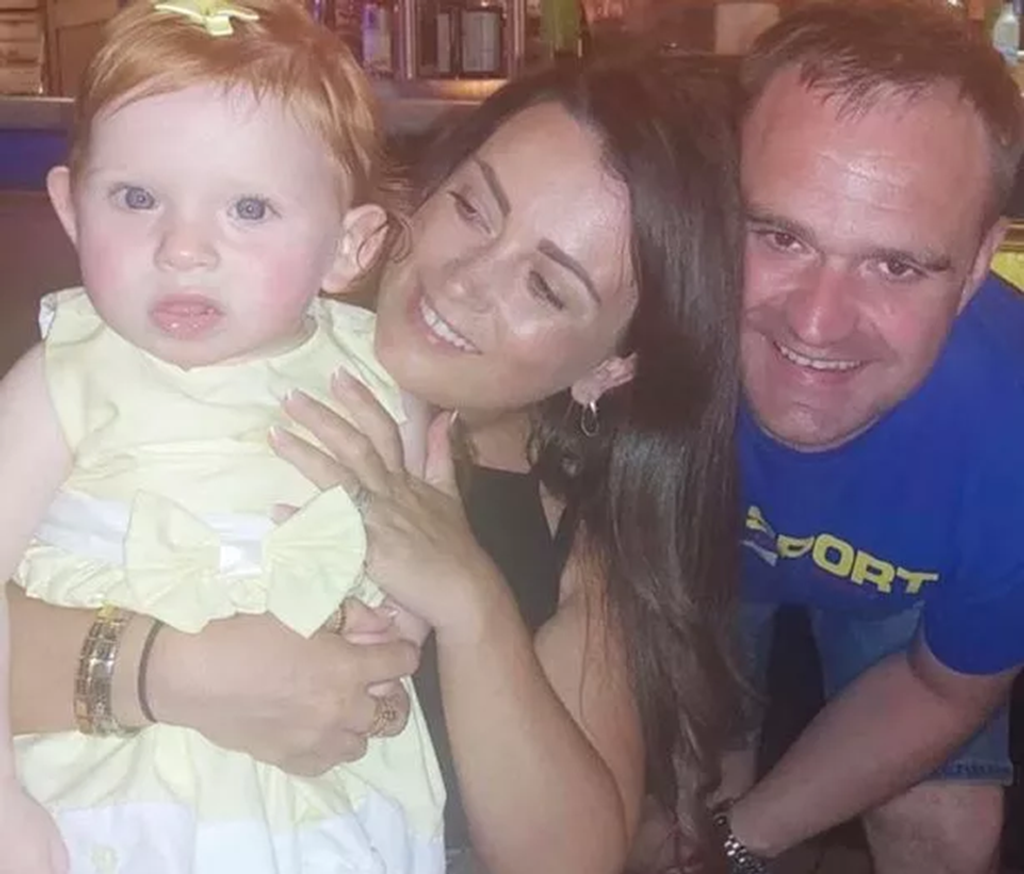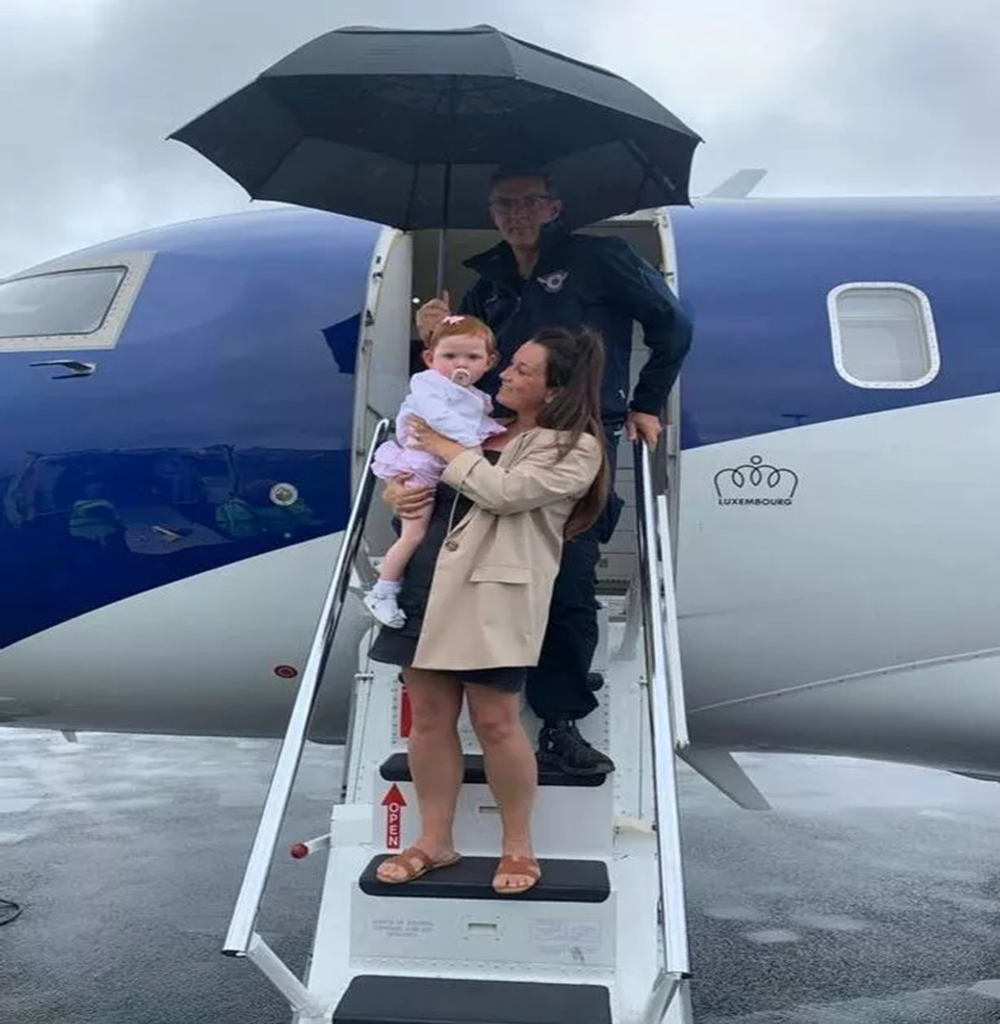A toddler who experienced a stroke while on vacation in Spain has been diagnosed with an extremely rare blood disorder, occurring only once in 10 million cases.
Georgia McLaughlin suddenly cried out in pain and experienced a seizure while on her inaugural holiday abroad, prompting her immediate transport to a hospital in Salou, Spain.
Diagnosing Moyamoya Disease
A brain scan revealed that the toddler had suffered a stroke, leading the family to be urgently transferred to a larger hospital in Barcelona. There, they spent two weeks in intensive care before being airlifted back home.
Since July, the 18-month-old has been receiving treatment at Glasgow Children’s Hospital, where she underwent two significant brain surgeries. It took nearly six weeks for neurology specialists to identify her condition as Moyamoya disease—a rare vascular disorder known to precipitate strokes.

Georgia, pictured with mum and dad Kirsty and Andrew McLaughlin, had a stroke on holiday.
The toddler’s mother, Kirsty, a network officer for Glasgow Council, said: “Georgia had only recently begun to walk and talk. She appeared irritable one day, but it turned out she was teething. Her arm suddenly went limp, and I realized something was wrong. Then she screamed out a painful cry that I’d never heard before.
“She appeared to be having a seizure.” We took her to the nearest hospital, where a scan revealed it was a stroke. I’d never heard of a baby having a stroke.
The devastated parents spent two weeks in June of last year, uncertain if their daughter would survive, communicating with Spanish doctors via Google Translate.

She said, “Not knowing if she’d make it was scarry. She was so poorly sick she couldn’t fly home for two weeks. We traveled by air ambulance to Glasgow’s Sick Kids Hospital.”
Doctors were puzzled by Georgia’s condition, prompting her referral to a specialist at Great Ormond Street Hospital in London. Following extensive testing over several weeks, she received a diagnosis of Moyamoya disease, a condition where the arteries in the skull narrow and become blocked. This rare affliction affects one in a million individuals, but due to its advanced stage in Georgia, hers is considered one in 10 million.
The Fight for Recovery: Surgeries and Setbacks
Plans were made for the toddler to undergo brain surgery. However, tragically, she experienced a devastating stroke that rendered her blind and unable to walk or speak.
Kirsty, aged 37, shared with the news platform, “The doctors in Glasgow were perplexed by the situation. We were referred to Great Ormond Street Hospital for a proper diagnosis. They were taken aback by how young Georgia was to be experiencing a stroke. Scans revealed that both sides of her brain were affected by the strokes, necessitating two surgeries. We were informed of a 50% chance of survival for the brain surgery, but doing nothing would inevitably lead to fatal strokes.
“Then, she suffered a catastrophic stroke. She lost her vision, became limp, and couldn’t support her head. It felt like I had lost my precious daughter.”
Despite the daunting challenges, the courageous toddler has undergone two successful brain surgeries, with the latest one performed on April 9. Her parents remain hopeful that her condition will stabilize, enabling her to regain her ability to walk and talk. They have even reserved a spot for her at a nursery.
Ongoing Support and Future Hopes
Throughout this difficult journey, the family has received support from CHAS.
Kirsty continued, “She’s a little warrior who needs to learn to do everything again. She is already attempting to stand and will learn to walk again with physiotherapy.
“Three strokes and two brain surgeries, and she’s handled them all with ease. She’s an absolute star.
“We went through IVF before I became pregnant with Georgia. She’s our miracle baby. She will have annual MRIs to evaluate her condition, but we are hopeful that she will continue to improve.
“Every Thursday, the CHAS nurses give us a break; it’s fantastic, and she adores them.
“We have just gotten home after months of being in hospital. and can’t wait to enjoy life as a family.”
Disclaimer Statement: This information is from a third-party health news channel. The opinions expressed here belong to the respective authors/entities and do not reflect the views of Docquity. Docquity does not assure, endorse, or vouch for any of the content and bears no responsibility for it in any way. It is essential to take all necessary steps to ensure the information and content provided are accurate, current, and verified. Docquity disclaims any express or implied warranties related to the report and its contents.
References
Toddler diagnosed with ultra-rare disease after suffering stroke on holiday [Internet]. Accessed on May 08, 2024. Available at: https://www.mirror.co.uk/news/health/toddler-diagnosed-ultra-rare-disease-32708458?int_source=mantis_rec&int_medium=web&int_campaign=more_like_this
About Docquity
If you need more confidence and insights to boost careers in healthcare, expanding the network to other healthcare professionals to practice peer-to-peer learning might be the answer. One way to do it is by joining a social platform for healthcare professionals, such as Docquity.
Docquity is an AI-based state-of-the-art private & secure continual learning network of verified doctors, bringing you real-time knowledge from thousands of doctors worldwide. Today, Docquity has over 400,000 doctors spread across six countries in Asia. Meet experts and trusted peers across Asia where you can safely discuss clinical cases, get up-to-date insights from webinars and research journals, and earn CME/CPD credits through certified courses from Docquity Academy. All with the ease of a mobile app available on Android & iOS platforms!






